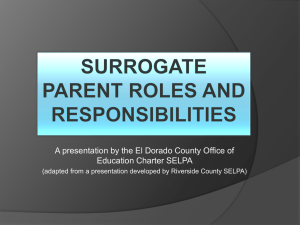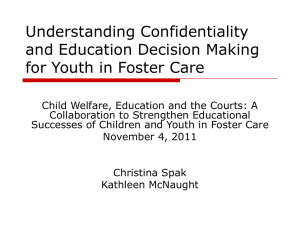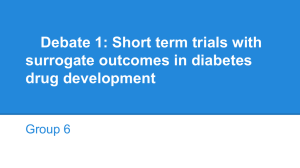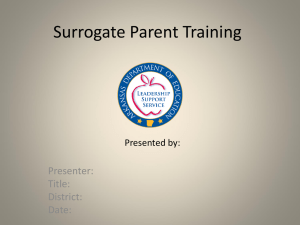Legal Background - the Kentucky Council of Exceptional Children!
advertisement
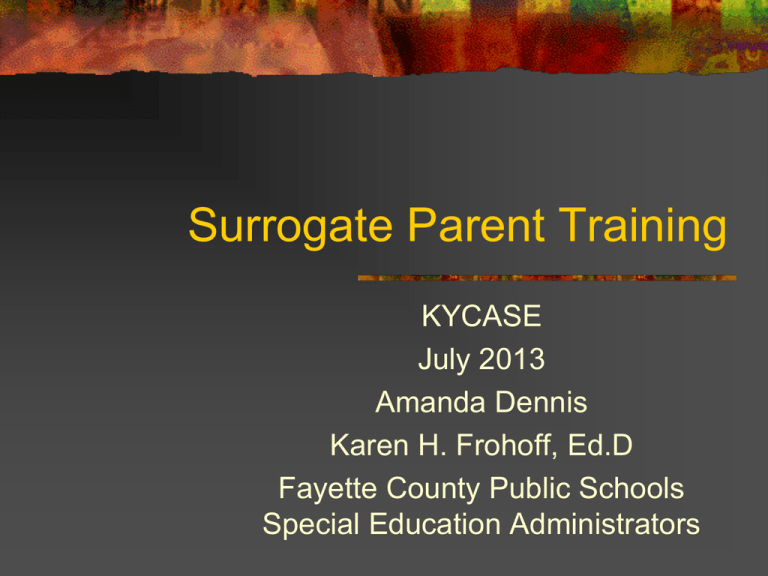
Surrogate Parent Training KYCASE July 2013 Amanda Dennis Karen H. Frohoff, Ed.D Fayette County Public Schools Special Education Administrators Legal Background Individuals with Disabilities Education Act (IDEA) Family Educational Rights and Privacy Act (FERPA) No Child Left Behind Act (NCLB) Americans with Disabilities Act Section 504 of the Rehabilitation Act McKinney Vento Homeless Assistance Act (42USC Sec. 11434a(6)) Legal Definition of Parent A biological or adoptive parent of a child; A guardian generally authorized to act as the child’s parent, or authorized to make educational decisions for the child, but not the state if the child is a ward of the state; A person acting in the place of a biological or adoptive parent such as a grandparent, stepparent, or other relative with whom the child lives, or a person who is legally responsible for the child’s welfare; Legal Definition of Parent – cont. A foster parent if the biological or adoptive parents’ authority to make educational decisions on the child’s behalf has been extinguished and the foster parent has an ongoing, long-term parental relationship with the child, is willing to make the educational decisions required of parents under 707 KAR Chapter 1, and has no interest that would conflict with the interests of the child; Legal Definition of Parent – cont. A foster parent if the biological or adoptive parents grant authority in writing for the foster parent to make educational decisions on the child’s behalf, and the foster parent is willing to make educational decisions required of parents under 707 KAR Chapter 1, and has no interest that would conflict with the interests of the child. A surrogate parent who has been appointed in accordance with 707 KAR 1:340, Section 6. Determination of Educational Representative Form http://education.ky.gov/specialed/excep/Pages/S pecial-Education-Forms---Due-Process.aspx Consult legal advisor when in doubt regarding determining who can represent the child and give consent. Assignment of a Surrogate Parent Part B Regulations No parents can be identified The school district cannot determine the whereabouts of a parent after reasonable attempts to do so The child is a ward of the state, or The child is an unaccompanied homeless youth (McKinney-Vento Homeless Assistance Act) Documentation when parent cannot be located Multiple attempts through multiple means should be well documented over multiple dates by multiple personnel to substantiate the claim that parents cannot be located. Recommendation: Log all attempts in IC for consistency. Surrogate Parent – KARs Sp Ed Shall not be an employee of the Kentucky Department of Education, the LEA, or any other agency that is involved in the education or care of the child: Shall not have any personal or professional interest that conflicts with the interests of the child; and Shall have knowledge and skills that ensure adequate representation of the child. Students Over the Age of 18 Students between the ages of 18 and 21 who have been declared incompetent in court are assigned a surrogate parent who has all the rights and responsibilities of any surrogate parent. For students who have not been declared incompetent, the services of a surrogate parent “advisor” can be offered to assist the student in making decisions. All decisions rest with the student and the student is in control of all his/her educational records. Assignment of a Surrogate Parent Part C Regulations If a surrogate parent is appointed for an infant or toddler, the parent has all the rights that a parent has under Part C. 34 CFR 303.422(f). A foster parent may act as a child’s “parent” if permitted by state law. A guardian may serve as a parent but NOT if the state is the guardian for a child. Assignment of a Surrogate Parent Part C Regulations (continued) LEA cannot name as a surrogate any person who provides early intervention services to the child or to any family member. 34 CFR 303.422(d)(2)(i). Employees of state agencies are ineligible to serve as surrogate parents. 34 CFR 303.422(d)(2)(i). Disinterested Parents LEA cannot appoint a surrogate parent in situations where otherwise available parents refuse to participate in the educational planning process. A district cannot obtain an injunction against parental participation in IDEA eligible student’s educational programming. Surrogate Parent Criteria Be an adult 18 or over; Commit to personally and thoroughly acquaint themselves with the student’s educational needs; Possess the necessary knowledge and skills to effectively represent the student; Be familiar with the educational system; Surrogate Parent Criteria Be readily accessible to the student; Have no conflicting or vested interest. Potential Surrogate Parent Candidates Foster Parents: if a child lives in a foster home, foster parents can be appointed as educational surrogate parents as long as they meet the qualifications and are willing to serve in that role. Community Volunteers: University personnel, retired teachers from other districts, etc. Legal Guardians or Other Family Members: Potential Surrogate Parent Candidates If possible, a surrogate parent should be of the same racial, cultural and linguistic background as the student. They should be able to communicate with the student in his/her primary language and share some of the same cultural values in order to fully understand the child. Recommendation/Consideration Consult with board attorney to consider requiring criminal background check and child abuse/neglect check, particularly if the Surrogate will have direct contact with the student. Timeline for Assignment of a Surrogate The LEA must make “reasonable efforts to ensure the assignment of a surrogate parent not more than 30 days after a public agency determines that the child needs a surrogate parent”. 34 CFR 300.519 (h). Personal and District Liability There is no guarantee that attempts to hold a surrogate parent liable for their actions will not be made. Ensure they can demonstrate their knowledge and skills and acted in good faith. District’s have greater liability if they fail to implement a sound surrogate parent training program and fail to assign a surrogate for an eligible student in need. Both parties need to demonstrate they “acted in good faith” for the benefit of the student. Limitations of the Surrogate Parent A surrogate parent has no authority or responsibility for the care, maintenance, or financial support of the student. Surrogate parent has no authority or responsibility to participate or approve a foster or group home placement for a child. Surrogate parent is only responsible for making decisions regarding the provisions of a free, appropriate program for the student. Termination of Surrogate Parent Assignment Schools may discontinue a surrogate assignment for the following reasons: Student changes schools Student changes districts Student reaches the age of 18 Child’s status changes and he no longer is eligible for a surrogate parent The district does not believe the surrogate has done an adequate job in his/her role. Sample form for documentation Surrogate Parent Determination Form Used for appointment Surrogate Parent Termination Form Sample Guidance Document Surrogate Parent Guidance Document Use as a review of rights and expectations when training Surrogate Parents. Questions ? Acknowledgements Materials developed by CKSEC, Marti Ginter “Your Child’s Education,” a document prepared by KDE Materials developed by Upper Cumberland Educational Cooperative Training for Surrogate Parents Responsibilities Surrogate Parent Responsibilities Surrogate Parent Responsibilities Have all the rights afforded to parents. Represent the child in all matters relating to the identification, evaluation, and educational placement of the child and the provision of services to the child. Make decisions about educational issues for the child. Receive notice of proposed or refused actions. Provide or deny consent in writing. Surrogate Parent Responsibilities Participate in the Admission and Release Committee (ARC) meeting acting as the parent of the student. Maintain confidentiality of information about the student. Request an independent educational evaluation for the student, if necessary. Request mediation and/or impartial due process hearing on any matter Surrogate Parent Criteria Surrogate Parent Criteria Be an adult 18 or over; Commit to personally and thoroughly acquaint themselves with the student’s educational needs; Possess the necessary knowledge and skills to effectively represent the student; Be familiar with the educational system; Surrogate Parent Criteria Be readily accessible to the student; Have no conflicting or vested interest. Key Words and Phrases Key words and Phrases Admissions and Release Committee (ARC) –means a group of individuals, that is responsible for developing, reviewing, or revising an Individual Education Program for a child with a disability. Special Education Due Process Procedures Key Words and Phrases ARC Membership includes: Parent Child or youth when appropriate Regular education teacher of the child or youth Special education teacher who is knowledgeable of the disability District representative Related service personnel as appropriate Others as requested by members of the ARC Key Words and Phrases Procedural Safeguards (Parents’ Rights) A copy of the procedural safeguards notice shall be given to the parents of a child with a disability one (1) time a school year. A copy shall also be provided: Upon initial referral or parent request for evaluation; Upon the receipt of the first written complaint or filing of due process hearing in a school year; In accordance with discipline procedures when change of placement occurs; Upon request by a parent. Key Words and Phrases Procedural Safeguards (Parents’ Rights) The procedural safeguards notice shall include a full explanation of all the procedural safeguards available under the IDEA and Kentucky Administrative Regulations for Special Education. Key Words and Phrases ARC Member Excusal A member of the ARC may be dismissed from attendance, in whole or in part, if the parents and the district agree in writing prior to the ARC meeting if: That member is not necessary because the member’s area of curriculum or related service is not being modified or discussed in the meeting, or If their area is being discussed but the member submits in writing to the parent and ARC input into the development of the IEP prior to the meeting. Key Words and Phrases Assistive Technology Services – means any service that directly assists a child with a disability in the selection, acquisition, or use of an assistive technology device. Key Words and Phrases Special Education – means specially designed instruction, at no cost to the parents, to meet the unique needs of the child with a disability including instruction in the classroom, in the home, in hospitals and institutions, and in other settings. Key Words and Phrases Collaboration – means a teacher of exceptional children works with children with disabilities in the regular classroom to provide specially designed instruction and related services. Key Words and Phrases Free Appropriate Public Education (FAPE) –special education and related services that are provided at public expenses, under public supervision and direction, and without charge. Key Words and Phrases Specially-Designed Instruction (SDI) – means adapting as appropriate the content, methodology, or delivery of instruction to address the unique needs of the child with a disability and to ensure access of the child to the general curriculum. Key Words and Phrases Related Services – means transportation and such developmental, corrective, or supportive services as are required to assist a child with a disability to benefit from special education. Key Words and Phrases Least Restrictive Environment (LRE) – means the educational setting in which the student with a disability can learn effectively, based upon unique needs and capabilities, and interact with similar age peers who are not disabled. Key Words and Phrases Individual Education Program (IEP) – means a written plan of action developed by an Admission and Release Committee (ARC) to meet the specially designed instruction and related service needs of the student with a disability. Notice A written notice will be given to you as the surrogate parent: 1. When the child has been referred for special education services 2. Each time the ARC meets 3. Anytime the school plans to evaluate the student Notice 4. Anytime the school wants to initiate, continue or change the special education services for the student. Special Education Due Process Procedures Key Words and Phrases Child with a Disability – means a child evaluated in accordance with state regulations and as meeting the criteria stated in state regulations for: Special Education IDEIA Eligibility Categories Autism Deaf-Blindness Developmental Delay Emotional-Behavior Disability Hearing impairment Mental Disability (mild, moderate) Multiple Disabilities Orthopedic Impairment Other Health Impairment Specific Learning Disability Speech or Language Impairment Traumatic Brain Injury Visual Impairment The Process The Process Step 1: Referral Step 2: Evaluation Step 3: Eligibility Step 4: Individual Education Program Planning Step 5: Placement Step 6: Implementation and Progress Monitoring Step 7: Review Step 8: Re-evaluation Before Attending the First Meeting Surrogate parents should request and be given copies of all assessments, integrated reports and a full explanation to understand the child’s current needs, functioning levels, strengths and areas of concern. Attend academic conferences etc. Receive on-going communication about the child’s progress and placement. Act as an equal partner with school personnel in planning the IEP and during all ARCs. FERPA and Confidentiality Surrogate parents are not given access to all the personally identifiable information about the child’s family or background. Surrogate parents are required to follow FERPA regulations to keep confidential any information they gather from student records and or participating in the educational processes. All written copies of documents must be returned to the LEA if a surrogate chooses to no longer act in this role or if they are determined to be ineligible to serve. Special Education Due Process Procedures Step 1: Referral A written request for a child to be individually tested to determine if the child has an educational disability and needs specially designed instruction and related services Special Education Due Process Procedures Step 2: Evaluation A process of gathering information about the child’s educational needs and abilities through individual tests, review of school work, and school records, behavioral observations, interviews, and rating scales Special Education Due Process Procedures Step 3: Eligibility Reviewing the complete evaluation to determine if the child has an educational disability that adversely affects (has a negative impact on) the educational performance of the child Special Education Due Process Procedures Step 4: Individual Education Program Planning Writing an Individual Education Program (IEP) for the child Transition planning for postsecondary options will begin by eighth grade or age 14 Postsecondary goals and transition services begin by age 16 At age 18 the student becomes responsible for making their educational decision (Emancipated Youth). Special Education Due Process Procedures Step 5: Placement Deciding where the child will receive specially designed instruction and related services based on the least restrictive environment requirements Special Education Due Process Procedures Step 6: Implementation and Progress Monitoring Carrying out and collecting progress data on the specially designed instruction and related services that were designed to meet the IEP goals and objectives for the child Special Education Due Process Procedures Step 7: Review Reviewing the child’s IEP and the services being provided; and making needed changes in the IEP or placement to meet the child’s identified needs Special Education Due Process Procedures Step 8: Re-evaluation Re-determining eligibility based on a new evaluation of the child at least every three years Special Education Due Process Procedures An ARC shall not have to be convened in order to make minor, non-programmatic changes to the IEP, such as typographical errors, incorrect directory information about the student (birthdate, age, grade, address, school), and other information required on the IEP that was agreed upon by the ARC but incorrectly recorded. If the school makes any changes, all member of the ARC shall be given a copy of the changes and an explanation as to why the changes were made. If any member objects to the changes, an ARC meeting shall be convened to discuss the changes. Resolving Disagreements Resolving Disagreements 1. 2. 3. 4. Talk with the student’s teacher, principal, and director of special education. Request an ARC meeting. Meet with the superintendent of schools Request a mediator Resolving Disagreements Formal Complaint Mediation Request a due process hearing Appeal to KDE for a review of the hearing offices decision. Prepare a civil suit Limitations of the Surrogate Parent A surrogate parent has no authority or responsibility for the care, maintenance, or financial support of the student. Surrogate parent has no authority or responsibility to participate or approve a foster or group home placement for a child. Surrogate parent is only responsible for making decisions regarding the provisions of a free, appropriate program for the student. Termination of Surrogate Parent Assignment Schools may discontinue a surrogate assignment for the following reasons: Student changes schools Student changes districts Student reaches the age of 18 Child’s status changes and he no longer is eligible for a surrogate parent The district does not believe the surrogate has done an adequate job in his/her role. Summary Surrogates have the right to attend all ARC meetings about your student. Surrogates may request an ARC meeting about your child more frequently than once a year. The school district must have written permission before a student with an appointed surrogate can be individually evaluated. Summary The school district must have your written permission before your student can begin a placement to receive specially designed instruction and related services. Parent’s signature is not required on the IEP. However parent input is needed. Questions ? Acknowledgements Materials developed by CKSEC, Marti Ginter “Your Child’s Education,” a document prepared by KDE Materials developed by Upper Cumberland Educational Cooperative


